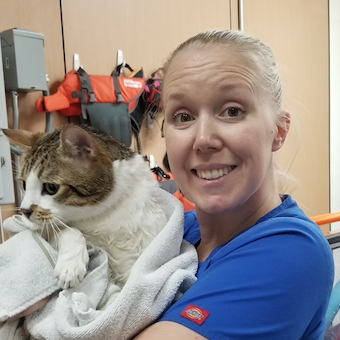Mentor and mentee relationships provide people with a strong sense of community and engagement — creating safe, structured spaces that facilitate growth and offering support systems that increase motivation and confidence.
Teams that focus on individual growth have happier, healthier work environments. When we want to grow our practice, upskill our staff, or make sure our staff feels safe and guided through their professional growth — mentoring is the path to that reality.
What is a mentor?
A mentor is a person who people respect and look up to. One who leads by example and whose words are cohesive with their actions. Someone who gives constructive feedback and aids in career development. A mentor reinforces positive steps taken and helps mentees cope with setbacks and negative emotions.
It is usually a senior employee who is seasoned in their field. They enjoy leading, sharing knowledge, and lifting up those around them. This could be a senior technician or assistant, manager, senior veterinarian, or lead receptionist. A mentor doesn't always work in the same practice or field as the mentee. In this case, they could be offering support with career choices and setting healthy boundaries instead of upskilling.
What is a mentee?
A mentee is a person who is open and willing to listen and learn. One who takes responsibility for their own personal growth and professional development. Someone ready to work hard to advance professionally.
These could be new graduates, assistants wanting to take on more technical responsibilities, individuals wanting to develop better leadership skills, managers looking for new and better ways of supporting their teams, veterinarians who want to learn more about business and owning their own practices. It can be any individual who wants to grow, develop new skills, and become more well-rounded as a professional.
What does a successful mentoring relationship look like?
A successful mentorship is one where both individuals work together to stay engaged and committed to the mentee's development.
These individuals respect and value each other's time. They use their time together wisely to maximize possibilities for goal setting and achievements. They feel comfortable working alongside each other, and the mentee does not fear the repercussions of their mistakes, as it is all part of the learning process.
A good mentor uses coaching techniques and allows the mentee to use their own problem-solving skills. The mentor-mentee relationship will thrive when these 5 steps are used as a guide for choosing a mentor or mentee:
1. Personal connection
When choosing a mentor or a mentee, it is best to choose someone with whom you have things in common. Whether it be similar values & belief systems, a similar work ethic, or educational background.
A mentee interested in a fear-free approach will do better with a mentor who also prefers this approach. Likewise, a punctual mentor who shows up prepared will do better with a mentee who also values these qualities.
2. Mutual respect
The mentor-mentee relationship is where both parties are invested in the mentee's growth and success.
The mentor was probably at one point in the mentee's place and helped to build them up and never trivialized the mentee.
The mentee trusts and respects the mentor's outlook and suggestions. For example, the mentor sees the mentee as capable and never talks down to the mentee when correcting mistakes in the mentee's work.
3. Communication & listening
Like any relationship, communication is key to its success.
The mentee will need to be open to the mentor's criticisms and use active listening skills to ensure they understand the information the mentor is sharing with them.
The mentor supports the mentee is looking for their own solutions and offers constructive criticisms that aid in building confidence in their problem-solving skills. The mentor must listen to the mentee's process and determine ways to support their needs and goals.
4. Realistic expectations
Their expectations of each other must be realistic and clearly outlined. Both are accountable for upholding their responsibilities within the relationship.
The mentor can only expect the mentee to perform tasks within their scope unless previously discussed that the mentee wants training and education in these areas.
The mentee can expect the mentor to offer training and guidance when it comes to technical skills but shouldn't expect the mentor to show them the same task repeatedly.
5. Commitment
Both parties must commit to the process. Mentorship takes hard work, time, and patience. Therefore, it is wise to create a schedule and length of commitment. Both parties are responsible for being on time and ready for meetings and sessions.
Commitment also means getting up when you're knocked down, literally and figuratively, to rise to challenges with the reward of knowledge on the other side. Mentorship is a two-way street; a committed mentee has a lot to offer the relationship by having a positive attitude, being coachable, and showing gratitude. The length of commitment is unique to each relationship, some may be short-lived, but others have been known to last a lifetime.
Start Building a Successful Mentor Relationship
Considering these 5 steps when approaching a mentorship will help set you up to get the most out of your experience. It may seem simple; it might even sound obvious to some, but the fact remains that any individual who desires to push the grasp of their understanding and skillset further within their field will benefit from choosing the right person to learn from.
An outstanding mentorship can teach both mentor and mentee, regardless of experience, and will always lead both people to grow positively from experience. Mentorship is extremely important in vet med and creates a culture that focuses on uplifting each other, building trust, supporting mental wellness, facilitating growth, and enriching the community.
The majority of people who have had a successful experience as a mentee are more involved in community leadership and mentoring others.




.gif)


